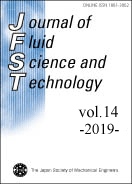
Journal of Fluid Science and Technology
Scope & Guideline
Transforming Mechanical Engineering Through Fluid Insights
Introduction
Aims and Scopes
- Fluid Dynamics and Hydrodynamics:
The journal publishes research on the fundamental principles of fluid dynamics, including flow behavior, turbulence, and boundary layer analysis, contributing to the understanding of complex fluid systems. - Numerical Simulations and Computational Fluid Dynamics (CFD):
A significant focus is placed on numerical methods for simulating fluid flows, utilizing advanced computational techniques such as CFD, Lattice Boltzmann methods, and machine learning approaches to solve intricate fluid problems. - Experimental Fluid Mechanics:
The journal emphasizes experimental investigations of fluid phenomena, including flow visualization, measurement techniques, and the study of fluid interactions with solid structures. - Multiphase and Complex Fluids:
Research on multiphase flows, non-Newtonian fluids, and their rheological properties is a core area, highlighting the complexities of fluid behavior in various applications. - Aerospace and Energy Applications:
The journal covers applications of fluid dynamics in aerodynamics, renewable energy technologies, and thermal management systems, addressing both fundamental research and practical engineering challenges.
Trending and Emerging
- Machine Learning and AI in Fluid Dynamics:
There is a growing trend in applying machine learning techniques to fluid dynamics, particularly for predictive modeling, optimization, and real-time data analysis, showcasing the integration of AI with traditional fluid mechanics. - Sustainable and Green Technologies:
Research focusing on environmentally friendly fluid technologies, such as carbon capture and renewable energy solutions, is on the rise, reflecting global trends toward sustainability and energy efficiency. - Biofluid Mechanics and Biomechanics:
An increasing number of studies are dedicated to understanding fluid dynamics in biological systems, including the mechanics of blood flow and the aerodynamics of insect flight, emphasizing the relevance of fluid dynamics in biological contexts. - Complex Fluid Systems:
There is an emerging interest in the study of complex fluids, including granular materials and colloidal suspensions, reflecting a broader understanding of fluid behavior under various conditions. - Advanced Materials and Fluid Interactions:
Research investigating the interactions between fluids and advanced materials, including superhydrophobic and smart surfaces, is gaining traction, indicating a multidisciplinary approach to solving fluid-related challenges.
Declining or Waning
- Classical Aerodynamics:
Research on traditional aerodynamic principles and fixed-wing aircraft has seen a reduction, as interest shifts toward more complex and innovative aerodynamic studies involving bio-inspired designs and novel geometries. - Static Fluid Mechanics:
Studies focusing on static fluid phenomena, such as hydrostatics or basic fluid statics, have diminished in favor of dynamic and time-dependent fluid behavior, indicating a trend toward more applied fluid dynamics. - Traditional Measurement Techniques:
The use of conventional measurement techniques for flow analysis is decreasing, with researchers favoring advanced methods like digital image correlation and laser diagnostics, which provide greater accuracy and insights.
Similar Journals

Experimental and Computational Multiphase Flow
Advancing Knowledge in Fluid InteractionsExperimental and Computational Multiphase Flow, published by SpringerNature, is a prestigious academic journal that critically examines advancements in the field of fluid dynamics, with a specialized focus on multiphase flow phenomena. Since its inception in 2019, the journal has established a remarkable reputation, attaining Q1 status in Fluid Flow and Transfer Processes as well as Mechanical Engineering according to the 2023 category quartiles, reflecting its high impact and relevance in these domains. With Scopus rankings placing it among the top 15 journals in both Chemical Engineering and Nuclear Energy and Engineering, Experimental and Computational Multiphase Flow is an essential resource for researchers, professionals, and students engaged in cutting-edge studies and applications. Although it operates on a subscription model, the journal remains dedicated to disseminating high-quality research and fostering a deeper understanding of complex fluid interactions across various scientific disciplines. By prioritizing innovative methodologies and interdisciplinary collaborations, the journal aims to significantly contribute to the ongoing evolution of multiphase flow research, recognizing its critical importance in engineering and energy sectors.

PERIODICA POLYTECHNICA-MECHANICAL ENGINEERING
Connecting Scholars, Advancing EngineeringPERIODICA POLYTECHNICA-MECHANICAL ENGINEERING, published by the Budapest University of Technology and Economics, is a distinguished open access journal that has been committed to advancing the field of mechanical engineering since its inception in 1969. With an E-ISSN of 1587-379X, this journal makes a significant contribution to the dissemination of cutting-edge research, currently holding a Q3 ranking in the prestigious Scopus category for Mechanical Engineering. Offering a platform for researchers to share innovative findings and methodologies, PERIODICA POLYTECHNICA serves as a vital resource for professionals, scholars, and students looking to stay abreast of the latest developments in mechanical engineering. With an open access format established since 1999, it ensures high accessibility to valuable knowledge, enabling a global audience to engage with pioneering studies while enhancing collaboration and knowledge-sharing within the field.
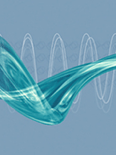
Annual Review of Fluid Mechanics
Charting New Territories in Fluid ResearchThe Annual Review of Fluid Mechanics, published by Annual Reviews, is a premier journal in the field of fluid mechanics, dedicated to advancing our understanding of fluid behavior through comprehensive and critical reviews of contemporary research. With an impressive impact factor that reflects its stature—ranking Q1 in Condensed Matter Physics and positioned 4th out of 434 in Scopus’s Physics and Astronomy category—it stands as a vital resource for researchers, professionals, and students alike. Since its inception in 1970, the journal has provided vital insights and synthesized knowledge that drive innovations and applications across various scientific disciplines. Although it does not offer open access, the journal ensures rigorous editorial standards and captivating content that contributes meaningfully to the academic discourse in fluid dynamics. Published annually, the Annual Review of Fluid Mechanics continues to be a cornerstone for anyone interested in the complexities of fluid movement and its implications in both theoretical and practical contexts.

Fluids
Fostering knowledge exchange in the realm of fluids.Fluids is a leading open-access journal published by MDPI that commenced its publication in 2016, fostering a vibrant platform for the dissemination of high-quality research in the fields of Condensed Matter Physics, Fluid Flow and Transfer Processes, and Mechanical Engineering. Based in Switzerland, the journal has earned a prominent reputation, achieving a Q2 categorization in the latest 2023 rankings, indicating its significant impact within respective subject areas. Researchers and professionals will find Fluids an invaluable resource, as it not only facilitates the sharing of innovative studies but also provides open access to research findings, ensuring widespread visibility and utility. With a diversified editorial board and a commitment to exploration in fluid dynamics and related applications, Fluids aims to advance knowledge, foster collaboration, and inspire future research endeavors among its readership. As the journal converges into new frontiers from 2016 to 2024, it continues to be a pivotal reference for scholars and practitioners alike.
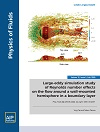
PHYSICS OF FLUIDS
Advancing the Frontiers of Fluid DynamicsPHYSICS OF FLUIDS is a premier journal published by AIP Publishing that serves as a vital resource for the fluid mechanics community. With an impressive impact factor and a consistent ranking in the Q1 quartile across multiple related disciplines—including Computational Mechanics, Condensed Matter Physics, Fluid Flow and Transfer Processes, Mechanical Engineering, and Mechanics of Materials—this journal is renowned for disseminating high-quality research in the dynamic field of fluid dynamics. Covering a wide range of topics, from fundamental fluid mechanics to advanced computational modeling, PHYSICS OF FLUIDS plays a crucial role in advancing understanding and fostering innovation in both academic and industrial applications. With its strong reputation and significant readership, this journal is essential for researchers, professionals, and students seeking to stay updated on the latest developments in fluid physics.
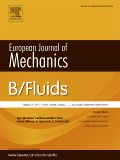
EUROPEAN JOURNAL OF MECHANICS B-FLUIDS
Exploring the Depths of Fluid DynamicsThe EUROPEAN JOURNAL OF MECHANICS B-FLUIDS, published by Elsevier, is a prominent journal in the field of fluid mechanics, addressing the theoretical and experimental aspects of fluid behavior. Since its inception in 1990, this journal has consistently fostered a robust academic dialogue, maintaining a significant impact evidenced by its Q2 ranking in both Mathematical Physics and Physics and Astronomy categories as of 2023, placing it among the top publications in these disciplines. Researchers and professionals focusing on fluid dynamics will find a wealth of knowledge in its articles, which span broad topics pertinent to real-world applications as well as fundamental theories. While the journal is not open access, it offers critical insights that shape ongoing studies in fluid mechanics, making it an invaluable resource for anyone looking to deepen their understanding of the field. Located in the innovative environment of Amsterdam, Netherlands, the journal serves as a nexus for cutting-edge research and collaboration globally.
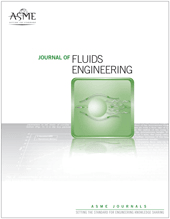
JOURNAL OF FLUIDS ENGINEERING-TRANSACTIONS OF THE ASME
Unveiling Insights in Thermal and HydrodynamicsJOURNAL OF FLUIDS ENGINEERING-TRANSACTIONS OF THE ASME, published by the renowned American Society of Mechanical Engineers (ASME), stands as a pivotal platform for disseminating cutting-edge research in the field of mechanical engineering, specifically focusing on fluid mechanics and its diverse applications. With an established history dating back to 1897, this journal features research that pushes the boundaries of knowledge and technology in areas such as fluid dynamics, thermal engineering, and hydrodynamics. Although it is not an open-access journal, it maintains rigorous peer-review standards, ensuring the publication of high-quality scholarly articles that contribute to the academic and professional community. In the latest rankings, it holds a respectable position within the Q2 category of mechanical engineering journals, reflecting its significant impact, as evidenced by its Scopus rank of #204 out of 672, placing it in the 69th percentile. Researchers, professionals, and students alike will find this journal to be a vital resource for the latest developments and innovative insights in fluids engineering.

Flow
Pioneering research that propels engineering into the future.Flow is a premier open access journal published by Cambridge University Press, dedicated to advancing research in the fields of Aerospace Engineering, Biomedical Engineering, and Fluid Flow and Transfer Processes. Launched in 2021, Flow has rapidly gained recognition and has achieved a prestigious Q1 ranking in its categories for 2023, underscoring its influential role in disseminating high-quality research. With an emerging impact factor and a strong commitment to accessibility, the journal provides a crucial platform for researchers, professionals, and students to share innovative findings and foster collaboration across disciplines. Flow is headquartered in the United Kingdom and is part of Cambridge University's effort to promote scholarly communication that transcends traditional barriers. Whether you are looking to submit your work or explore cutting-edge studies in your field, Flow offers a dynamic and rigorous environment for intellectual exchange.
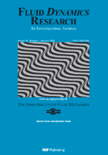
FLUID DYNAMICS RESEARCH
Pioneering Discoveries in Fluid Flow and Transfer ProcessesFLUID DYNAMICS RESEARCH, published by IOP Publishing Ltd, is a pivotal journal dedicated to advancing the understanding of fluid dynamics through interdisciplinary research that spans several domains including mechanical engineering and physics. With an ISSN of 0169-5983 and E-ISSN 1873-7005, this journal provides a vital platform for researchers aiming to disseminate new findings and theoretical advancements in fluid flow and transfer processes. As of 2023, FLUID DYNAMICS RESEARCH holds a commendable position within the academic community, ranked Q3 in fluid flow and transfer processes, mechanical engineering, and miscellaneous physics and astronomy categories. The journal showcases a diverse array of articles that not only inspire collaboration among professionals and students but also ensure that theoretical and experimental studies are accessible for further development in the field. Operating from the United Kingdom, the journal offers a unique opportunity for scholars worldwide to contribute to the vibrant community dedicated to understanding the complexities of fluid dynamics, even as it anticipates converging its years of research from 1986 to 2024.

ATOMIZATION AND SPRAYS
Pioneering Studies in Chemical Engineering ApplicationsATOMIZATION AND SPRAYS, published by BEGELL HOUSE INC, stands at the forefront of research in the dynamic field of chemical engineering, particularly focusing on the intricate processes of atomization and the mechanics of droplet dynamics. Established in 1996, this prestigious journal aims to disseminate innovative findings and methodologies that drive advancements in applications ranging from spray technologies in industrial processes to environmental technology and energy conversion systems. With a current Impact Factor that reflects its significance within the community—ranked in the Q3 quartile—it serves as a comprehensive resource for researchers, professionals, and students eager to deepen their understanding of fluid mechanics and spray applications. Though not an open-access publication, it provides critical insights and a platform for scholarly communication and exchange in its converged years, fostering collaboration and innovation within the domain.